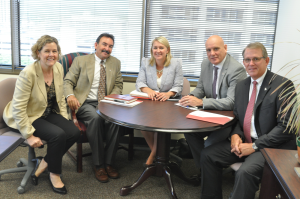Ensuring better regulation: IADC continues to engage Texas Railroad Commission on Rule 13
Association meets again with state agency to maintain open, ongoing communication, ensure regulator hears industry’s voice
By Amy Rose, Director – External Relations, IADC

Securing better regulation is a key objective of IADC. Ensuring that any regulation is necessary, operationally appropriate and implementable, fit for purpose, affordable, and appropriate with no unforeseen consequences is key to the strategy of the association’s Policy, Government and Regulatory Affairs (PGRA) division.
“IADC’s PGRA capabilities deliver significant value to our members, and in the last two years, we have seriously stepped up our PGRA efforts. First, by recruiting recognized experts to lead our activities internationally and in Washington, DC, and second, by reorganizing our operational integrity function to ensure the two divisions are linked internally,” said Stephen Colville, IADC President and CEO. “With a focus on the critical issues facing our members, we are proactively working to influence political thinking to secure enabling regulation and advocating for better regulation to secure more constructive oversight by regulators. Structuring ourselves in this way has paid off in several areas but has more recently positively impacted IADC’s onshore members with operations in Texas.”

In January 2014, the Railroad Commission of Texas (RRC) amended Rule 13, the primary purposes of which are to protect fresh water and maintain well control. Subsections of the rule required well control equipment to comply with API Standard 53, which was originally drafted with offshore equipment in mind. The regulation includes language that could significantly impact onshore contractors, where the rule could mean the difference between a contractor moving ahead or idling a unit due to the extraordinary cost of modifying equipment. The RRC is Texas’ primary regulatory body governing the exploration and production industry. The RRC regulates more than 265,000 active oil and gas wells and 270,000 intrastate pipeline miles and hydraulic fracturing.
In late 2014, a group of IADC staff and members met with RRC staff to discuss the implementation of the rule for onshore contractors.
The RRC’s Oil and Gas Division Director, Lori Wrotenbery, acknowledged IADC’s concerns at the 2015 IADC Drilling Onshore Conference in May. “We are aware that there’s some perfectly good equipment out there that may not meet the new standard and that may basically be rendered obsolete if we’re not careful about how we approach the implementation.”

“In any situation, the industry wants to ensure that it’s responsibly complying with all regulations. It’s part of our job, and we take it seriously,” said Mike Garvin, Senior Vice President, Operations Support for Patterson-UTI and VP of the IADC Onshore Division. “When we saw the initial regulations that came out of the RRC, we became concerned because these were regulations that were not possible for the onshore industry to comply with as written. IADC took the initiative and reached out to the RRC, where we found the leadership of the Oil and Gas Division willing to listen and work with us to constructively clarify Rule 13 to ensure all onshore operations are compliant. It’s a testament to our mutual desire for better and enabling regulations and for reasonable laws that will enable us to make continuous improvements.”
Indeed, in a recent opinion contribution to “Forbes” magazine, Railroad Commissioner Christi Craddick noted that regulators in Texas “strike the balance between sensible, science-based regulation and basic free market principles.”
“The RRC has a big responsibility, as the eyes of other US states are upon them, and they have bold leadership who see the value in ensuring the safety and transparency of oil and gas operations in the state of Texas. And they are doing an exemplary job,” Mr Colville commented.
IADC leadership recently met with the RRC staff to maintain open and ongoing communications to ensure the agency’s rules are fully understood by industry so they may be implemented safely and successfully.

“IADC is not political. We take an educative stance on advocacy, as our work with the RRC indicates,” Mr Colville said. “We seek to work with all regulatory bodies on better regulation that is fit for purpose, consistent, practical and enables drilling operations. We have made significant inroads in just a few short years to ensure that the voices of IADC’s members are heard and considered. As the authoritative voice for the drilling industry, it is our duty to work collaboratively to ensure our continued access to drilling. The work continues, and I look forward to building on our relationships with regulators not just here in Texas but in all geographies where IADC members have operations.”
Click here to view a video about IADC’s collaborations with regulators.




